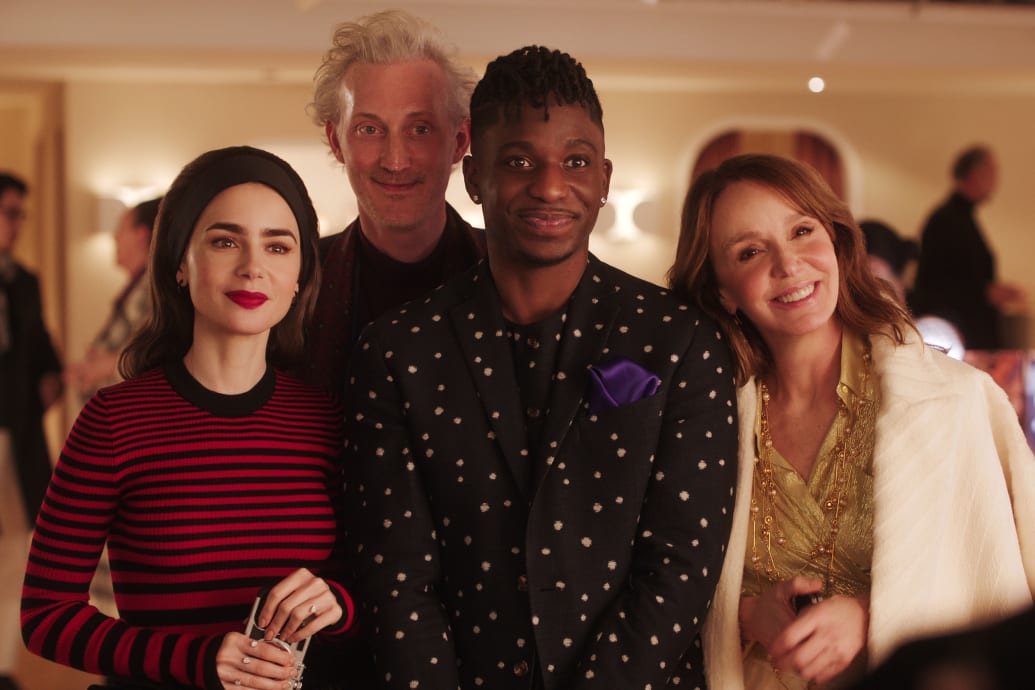An attempt to script a sensitive #MeToo storyline into the frothy show was as cringe-inducing as you’d expect—and proof that the series has outgrown its self-absorbed heroine.
To resurrect a phrase coined by Succession’s Logan Roy, Emily Cooper is not a serious person. By Season 4 of Emily In Paris, the non-French speaking American social media marketer has somehow convinced a French marketing firm that she is an essential cog in their machine. Meanwhile, she floats through Paris in her outlandish outfits and wreaks havoc on every new friend and potential love interest she encounters, all while remaining blissfully aware of each and every faux pas she commits.
Naturally, it’s all a bit of fun, complete with the signature Darren Star stamp of silliness. Like his previous offerings (see Sex and the City and Younger), Emily in Paris is flippant and light and filled with gossip-worthy fashions. The flawed heroine makes idiotic decisions and stumbles through her romances all against the blurry backdrop of stylish parties and girly brunches—or, in Emily’s case, croissants on café patios. This is the basic blueprint of a Darren Star show and Emily in Paris has stuck to it—at least it has up until now.
This season, the show has introduced one of the darkest subplots in its run thus far.
While Emily (Lily Collins) is humming and hawing between hot-chef-Gabriel (Lucas Bravo) and British-pretty-boy Alfie (Lucien Laviscount), her boss, the austere and very chic Sylvie (Philippine Leroy-Beaulieu), is dealing with far graver matters.

She begins receiving calls from a journalist at Le Monde who is writing an investigative piece about her former boss, Louis de Léon (Pierre Deny). Although her husband has just gone into business with the fashion mogul to open a club, Sylvie decides to go on the record and recount her experiences of misogyny and harassment with him.
Meanwhile, Emily’s bestie Mindy (Ashley Park) also finds herself embroiled in the emerging scandal—she is in a relationship with Louis de Léon’s son, Nicolas (Paul Forman). After Sylvie’s interview is published, she stands her ground and refuses to appear in photo ops with her boyfriend and his father.
In other words, Emily in Paris is delving into its own #MeToo arc this season, confronting the culture of misogyny embedded into the fashion industry. But where does the show’s heroine fit into all of this? So far, she hasn’t.
In fact, Emily Cooper remains firmly inside her own frothy little bubble. While her boss and friend find themselves dealing with the confronting and potentially traumatic ordeal of coming forwards against a titan of the fashion industry, Emily brushes it off as just another day at the office. When Sylvie comes into work after bravely speaking to le Monde, Emily’s only response is to grin idiotically in her face and squeal, “There’s my ‘she-ro’!”
When Sylvie explains that Louis’ company’s investment was “contingent on her being quiet” and her husband’s club is “dead,” all Emily cares about is the work she has already put into the club’s opening. “What? But we’re opening this weekend and people are flying in!” she whines.
Emily is no more understanding when it comes to Mindy. After Mindy has a fight with Nicholas about his “skeezy” father, she comes to Emily’s flat. Of course, Emily’s main concern seems to be the fact that Mindy’s problem has interrupted her makeout session with Gabriel and the conversation very swiftly turns to her romantic problems.
The Louis de Léon plotline this season is one of the most thought-provoking arcs in the show so far. It raises complex themes and offers up simplistic questions. It gives both Philippine Leroy-Beaulieu, who plays Sylvie, and Ashley Park, who plays Mindy, new depths to explore. As Leroy-Beaulieu said to Today, “I don’t pretend to be the character that’s going to inspire anyone to do this, the people already doing it, which is great,” the actor says. “I just think, you know, it’s important to remind people that, yeah, we don’t have to take these things.”
The problem with shoehorning a #MeToo arc into Emily in Paris is that the show is still treating Emily as its heroine. The main focus remains on her romantic escapades—on her silly little career blunders. And because she as a character doesn’t seem to have the capacity to engage with this darker subplot beyond offering up the cringe-y and utterly empty girlboss phrase “she-ro,” the entire plotline is glossed over in the space of about two episodes.
It’s a shame: This was a rare opportunity to explore the complexities of the #MeToo movement in France, which has unraveled in its own unique way thanks to the differences between American and French culture.

Of course, Part 2 of Season 4 could return to the subplot. Perhaps we’ll even see Emily being forced to confront why she was so reluctant to properly engage with her friend and co-worker’s initial involvement. But based on the light tone so far, it seems unlikely Emily will be doing too much self-reflection beyond asking herself why, oh why Gabriel still cares about his ex-girlfriend who is, as far as he knows, pregnant with his child. (The answer to that question is pretty obvious to everyone except Emily, but that’s another rant entirely.)
Perhaps it’s finally time to admit that although Emily Cooper may be the titular character of this show, she is also the least interesting—and if Emily in Parisreally wants to get a little deeper, as its latest subplot implies it does, maybe the show needs to spend a little less time with its American in Paris and a little more time plumbing the depths of its other characters.
Or, of course, the show could opt to keep things light and frothy and girlboss-ified. But one thing it probably can’t get away with is trying to have it both ways. Even queen of the love triangle Emily Cooper might be able to tell you that.





